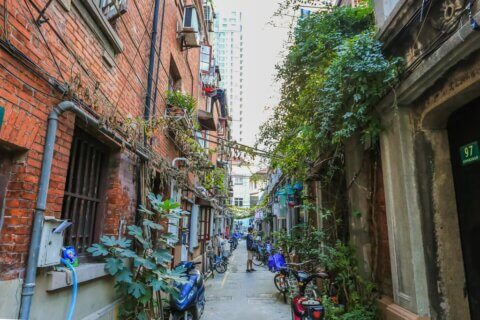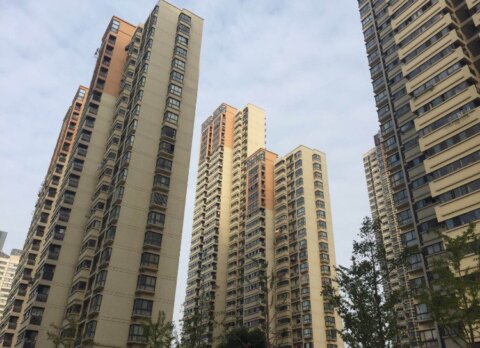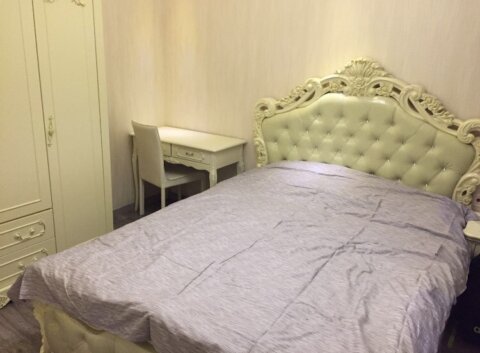Renting in Shanghai ⭐️ What’s the Truth?
Welcome to our complete guide to renting in Shanghai (in 2022).
So you’ve decided to pack all your things and book a one-way ticket to China, more specifically Shanghai.

After living in hostels for a while, you concluded that this is the most awesome place on Earth and decided to live here.
Or perhaps you chose Shanghai even before you set foot in China. Or maybe you were sent here for work.
Whatever the case may be, the next thing on your list – to find a place to live.
It may sound like an impossible task at first, when you can’t even have a conversation with a local without shoving your phone up their face. But worry not; you can do it, as did many expats who came before you. So take a deep breath, and ready, set, go!
Renting in Shanghai – The Process
Renting in Shanghai – Getting in Touch with Agents
Renting in Shanghai – How to Find Agents
Renting in Shanghai – Looking at Houses
Renting in Shanghai – Negotiate
Renting in Shanghai – Signing the Contract
Renting in Shanghai – A Few Useful Tips
Renting in Shanghai – Process
After living in a few different cities, I’ve come to realize that no matter where you are, the renting process is generally the same.
It’s no different in China.
The language may be different, the houses may look different, and the terms of the contract might be slightly different, but generally speaking, it’s a pretty standardized process.
Here is a break down:
1. Do your homework
2. Define your criteria (AKA figure out what you want)
3. Get in touch with agents (yes, plural. More on why later)
4. Look at houses
5. Negotiate
6. Sign contract
Do Your Homework
Where to Start
The first thing I did when I had to find a place in Shanghai was typing “renting in Shanghai” into the Google search bar.
If this sounds like you, you are off to a great start. It never hurts to do your own research ahead of time. Knowledge is power!
You might come across websites like smartshanghai.com where agents and owners post places for rent.
Browsing through listings is helpful at this stage as it gives you a feel for the rent prices and what the apartments look like.
Another great resource for rental listings is WeChat groups. I hope by this point, you’ve realized it’s near impossible to live in China without WeChat, which is like a one stop shop for pretty much everything.
I mean EVERYTHING; from staying connected with your friends to ordering a Uber, I mean Didi 滴滴, which is the Chinese equivalent. But I digress.
USEFUL TIP – Ask people you know to add you to rental groups on WeChat.
If you haven’t met anyone yet, ask on Facebook groups or Reddit. Once you are in, you will have more listings to look at for comparison.
Location, Location, Location

You also want to do some research on which area you might want to live in.
The most popular districts for expats are Jing’An(静安), Xuhui(徐汇), Huangpu(黄浦), and Putuo (普陀).
All of them are located in city center and the rent prices are therefore the more expensive in these places compare to the rest of Shanghai.
The nicest area among these is probably the Former French Concession (法租界), located in Xuhui and Huangpu districts and close to Changshu Road (常熟路) subway station.
It’s the top choice for many expats for its beautiful tree-lined streets and mellow atmosphere. You guessed it – it’s also the most expensive area to live in.
Define Your Criteria – Figure Out What You Want
Now that you have a general idea of the rent prices and what the apartments look like in Shanghai, it’s time to figure out what you want.
Don’t panic, I’m not asking you to figure out what you want to do with your life.
Finding a place to live is serious business but not THAT serious.
This is where you think about what’s important to you for your next place.
- Do you want to live with roommates or alone?
- Do you want to live in city center or away?
- How much do you want to spend on rent?
- How much space do you need?
Some Helpful Tips

Here are some tips to help you out.
It becomes much easier to answer the majority of these questions when you know your budget.
Here is what I mean.
If you want to live in city center, a short distance away from the train station, and alone with a balcony in an elevator building with a lot of space, you will likely pay more than 10,000 rmb for your place.
If you only make 15,000 rmb every month, it wouldn’t really make sense to fork over two-thirds of your monthly pay on rent.
A good rule of thumb on how much you should spend on rent, according to most personal finance gurus, is about 30% of your monthly income, give or take.
I’ll let you do the math from here.
But of course you can spend more or less if you so desire.
However, this is the limiting factor for a lot of people.
It’s not uncommon for people to start with a long list of criteria and realize after seeing a few apartments that they need to cut their list short (been there)!
It’s important to know your non-negotiables.
What is most important to you? Is it access to bars and restaurants?
Because having an amazing social life is your top priority?
Or is it proximity to work because you want to save as much time on commute as possible?
Once you’ve figured out your priorities, it’s time to hit up an agent…
Renting in Shanghai – Agents (中介)
Real estate agents can make your life a lot easier for the whole renting in Shanghai process.
Most expats find their apartments through an agent.
Think of them as your personal assistant during the process of apartment hunting.
They will help you sift through the hundreds and even thousands of rental listings and find the ones that fit your criteria.
If you are worried about the language barrier, worry not because there are many agents in Shanghai who speak English and can communicate with the landlord (房东) on your behalf.
They can help with negotiating and organizing everything such as necessary paper works, so you don’t have to!
Most of them can also help with police registration, internet and electricity.
My favorite part about having an agent is how much time they can save you.
If you are in a rush, they are able to find a place for you within days (although personally I recommend allowing yourself more than a couple of days to find an apartment so you don’t feel too pressured).
Renting in Shanghai – How to Find Agents?
Many of the listings on smartshanghai.com or any other apartment website you might have come across on the internet were posted by agents.
Check for their WeChat information or phone number on the listing and add them on WeChat and BOOM!
You’ve found yourself an agent.
After you’ve been added to a rental WeChat group, you will get notifications on available apartments, most of which are posted by agents. Add their contact if you find something you like.
USEFUL TIP – Another way to find agents is to ask people you know for recommendations for agents they’ve worked with and had a good experience with in the past.
Working with Agents
If you have noticed, the title of this section implies that you should get in touch with more than one agent.
Yes, it’s okay to work with multiple agents. In some places in the world, real estate agents will tell you that you are only allowed to work with one agent at a time.
It’s not the case here if you are just starting to look at apartments. Talk to as many agents as you feel necessary.
You want to shop around and explore various options so you can compare. Chat them up on WeChat (see what I did there?) and tell them your criteria and ask them how they can help you.
In Shanghai, the standard agent fee is either one month’s worth of rent or 35% of one month’s rent.
If they ask for more, be firm and tell them 35% is the standard.
It’s a good idea to ask about the agency fee before you start checking apartments so you’re not hit with a surprise at the end and waste your time.

3 Days in Shanghai 🤔 How To Spend 72 Hours in Shanghai?
3 Days in Shanghai | 72 hours isn’t a lot of time but it’s enough to see some great things in Shanghai. Find out what to do in Shanghai in our post.
Renting in Shanghai – Looking At Houses
By now, you will have talked to a number of agents over on WeChat and narrowed down on a few agents you want to see apartments with.
Now it’s time to move on to the next renting in Shanghai step and go to view some houses.
Some agents might have already told you they know a few places that fit your criteria.
A helpful tip here is to ask for actual pictures before you see the apartments. This way you are able to weed out any obvious ones that you definitely won’t like.

It’s also a common practice for agents to show you apartments outside of your budget.
It’s annoying but it’s expected, as most agents earn commission, which means the more expensive apartment they can rent out, the more they get paid.
You must be firm with them when that happens.
If an agent keeps showing you apartments outside of your range, feel free to ditch them.
You don’t want to waste any more of your time.
All of this is assuming that your understanding of the rent prices is realistic.
In general, 3000–5000 rmb can get you an average room to share in city center.
But expecting to find a room to share for 1500 rmb in city center is unrealistic (sorry, it’s true).
There are three main types of places you will see: apartments, lane houses, and compounds.
They vary in terms of price, number of rooms, and amenities.

Apartments (公寓)
New and old apartments can be found in Jing’An, Xuhui, Huangpu districts.
Not that surprising as all of them are considered city center areas.
They are usually elevator buildings with modern design and some might even have a gym in the building.
This is closest to the western apartments that many expats are used to.
Price is on the high side.
Lane Houses (弄堂)

Lane houses are great if you want to live alone, as a couple, or with one other roommate as they usually only have one or two bedrooms.
There are also studio and loft-like styled lane houses.
They are more affordable compared to new apartments.
On the flip side, because these are old houses, there is less light, and you might have problems with humidity, old pipelines and insects.
Compounds (小区)
Compounds are very common in Shanghai. Many of the local families and Chinese professionals live in them.
They offer a lot more bedrooms; most commonly two to three but they can have up to six or even seven bedrooms.

The buildings themselves are either five to six story walk-ups or a thirty-story building with multiple elevators.
If you are trying to get in shape, living on the top floor of a walk up might be a good idea. I kid, I kid.
But do remember to tell your agent if you don’t want to live beyond a certain floor on a walk-up.
Speaking of which, first floor of buildings here tend to get mouldy easily; some will have a very strong smell which you will notice immediately when you walk in.
If that is something you care about, I would avoid first floors as well.
OK… now l take you through the final steps of this process and share some helpful resources. We are almost there!
Renting in Shanghai – Negotiate
On top of the many benefits of having an agent, a really good agent can also help you negotiate on your behalf.
You might have heard from friends that it’s never a bad idea to negotiate in China.
Well, your friend is right, particularly when it comes to renting in Shanghai.
When the landlords set the rent for their apartments, nine times out of ten, they set it to the highest amount they can think of.
You will likely be able to negotiate it down 5-6%, even 10% if you are lucky, with the help of your agent.

There are also many other things you can negotiate for.
This is a good time to mention that almost all Chinese apartments come furnished, unless stated otherwise.
You may or may not like the furniture as sometimes it can be outdated and even mismatched.
You can ask the landlord to add or take away things that came with the apartment.
If they have it, they will usually add it without any problem. If the apartment is missing something essential, like a fridge for example, you should most definitely ask for it.
Utilities are usually not included in the rent in China.
You are likely expected to pay electricity, water, gas, and internet bills separately. Some places have management fees that are around 100-200 rmb each month.
A lot of the landlords are willing to pay for the management fees, so be sure to ask or bargain if yours don’t.
Generally though, utilities in China are much cheaper than they’d be in certain Western parts of the world even more so if you share with others.

Beijing vs Shanghai (2025) // Your Comprehensive & Complete Guide
Beijing vs Shanghai — they couldn’t be more similar, and they couldn’t be more different. But which one is for you? Find out first with our in-depth guide.
Renting in Shanghai – Signing the Contract
Finally, we are at the last step of this journey: signing the contract.
Don’t relax just yet because there are still things to look out for.
Be careful not to sign too fast.
Some agents or landlords may rush you into signing.
They will tell you things like “if you don’t sign today the place will be gone tomorrow”. That may or may not be true.
Either way, you don’t want to sign until you’ve had adequate time to think it over.
Before you sign the contract, you also want to check the apartment to make sure everything is working properly.
Check the faucet, hot water, AC, everything. If something is broken or missing, ask the landlord to have it fixed before you move in.
USEFUL TIP – It might sound like common sense but it’s still worth pointing out: do not sign anything unless it’s been translated into English.

It’s crucial that you understand everything that was being discussed and that all the points are clearly spelled out on paper, in English.
Some of the things to check off on the contract are size of the apartment, payday, monthly rent, contract length and any additional terms you negotiated (such as if the landlord agreed to pay for management fees).
It’s quite common in China to pay the rent a few months in advance. In addition to paying the rent at the beginning of every month, some landlords will ask you to pay for two to three months worth of rent in advance.
Moving into a new place can really put a dent in your wallet.
If you’ve been blessed with the contractual term to pay rent three months in advance, you need to prepare in advance not only three months worth of rent, but also the deposit, which is the equivalent of one month’s worth of rent, plus the commission to your agent.
Together they can add up to five months worth of rent. Yikes!
After you pay, be sure to ask for a receipt as proof of your payment. You want to have written proof of everything.
Renting in Shanghai – A Few Useful Tips
Fapiao and Company Rent Reimbursement
If you are lucky enough that your company reimburses you for the exorbitant rent in Shanghai, you will need to ask for a Fapiao (发票) from your landlord.
I would make this one of the first questions to ask as some places do not give out Fapiao.
Do expect to pay between 3%-5% fee on the Fapiao you are requesting.
Short Term Rental
It’s near impossible to find a place to rent month to month in Shanghai. Trust me, I’ve tried.
Your best bet is either Airbnb or hostels or if you’re coming to study with LTL take a look at our accommodation options.
Airbnbs tend to be more expensive, but the places are usually nicer.
Do read the reviews before you book, which can save you a lot of headache down the line.
Hostels are perhaps the most affordable option in terms of short term rental.
You can find a place as cheap as 80CNY per night. If you don’t mind living on a bunk bed for a month or two, hostels are your best bet.
Useful Resources

Here I’ll share some helpful resources I have not mentioned.
They are especially helpful if you want to venture out on your own without an agent.
It is doable, but it does require a lot of work.
And this requires that either you can read Chinese or have a good friend who can do it for you, as all of them are in Chinese.
One benefit of not using an agent, besides not having to pay the agent fee, is that you might find a place lower than market price. However, that is not always guaranteed.
Websites
- Ganji.com (赶集网)
- 58.com (五八同城)
- Douban.com (豆瓣网)
Both Ganji.com and 58.com are popular among Chinese locals to find apartments without an agent.
Landlords post listings on those websites directly and you can contact them yourself if you find something you like.
A word of warning, a lot of the pictures you see are not of the actual apartments and some listings will say they are posted by the owner when in fact they were posted by the agent.
Douban.com is a multi-purpose website popular among the younger population in China.
It was recommended to me as a great place to find roommates.
Apps
- Lianjia (链家)
- Ziroom (自如)
- Xianyu (闲鱼)
- Wellcee – (useful website/app if looking by yourself)
Both Lianjia and Ziroom are apps that allow you to browse available apartments on your own.
There are no agent fees.
However, Ziroom requires you to pay monthly management fee on top of the rent you are already paying.
This is to cover the concierge and the regular cleaning services they provide.
I found my last my apartment on Ziroom and I found their apartment to be slightly cheaper than market price.
Xianyu is a market place where people post apartments for rent and second hand stuff for sale.
It’s similar to Facebook market place.
Well, that’s a wrap! I hope the information was helpful to some of you who are new to renting in Shanghai.
Finding an apartment might be one of the biggest hurdles you have to overcome as someone new to any city really, but once you have a place of your own, everything else becomes easier.

Shanghai Facts (for 2022) – Numbers That Blow Your Mind
Shanghai Facts and Figures (for 2022) – Incredible Numbers In 2011 I got talking with a professor at Shanghai’s Fudan University. One thing he told me that day has stuck with me since. He told me that 25% of all…
BONUS | Why not check out our other guides on renting apartments in Beijing and renting in Singapore also!
Renting in Shanghai – FAQ’s
Is Shanghai expensive?
Shanghai is the most expensive city to live in China yes, but compared to notable other cities worldwide it probably comes up midway.
For example living in Hong Kong is far more expensive than Shanghai, as is Singapore.
How much of my salary should I put aside for rent in Shanghai?
A good rule of thumb on how much you should spend on rent, according to most personal finance gurus, is about 30% of your monthly income, give or take.
Where is best to live in Shanghai?
The most popular districts for expats are Jing’An(静安), Xuhui(徐汇), Huangpu(黄浦), and Putuo (普陀).
What are some good apps to find apartments in Shanghai?
Lianjia (链家)
Ziroom (自如)
Xianyu (闲鱼)
Wellcee – (useful website/app if looking by yourself)
What are the best websites to find apartments in Shanghai?
Ganji.com (赶集网)
58.com (五八同城)
Douban.com (豆瓣网)
Want more from LTL?
If you wish to hear more from LTL Mandarin School why not join our mailing list.
We give plenty of handy information on learning Chinese, useful apps to learn the language and everything going on at our LTL schools!
Sign up below and become part of our ever growing community!
Meanwhile, what about online Chinese classes? We’ve got the best teachers, all from the comfort of your own home!

 Hi, my name is Mojca. I am from Slovenia in Europe and I and I work as a student advisor at our Shanghai school.
Hi, my name is Mojca. I am from Slovenia in Europe and I and I work as a student advisor at our Shanghai school.





11 comments
[…] we went over the prep work you want to do to get started on the renting in Shanghai process. Hopefully by now you already know your non-negotiables and keep a list either on your […]
[…] we went over the prep work to do to get started on the renting in Shanghai […]
[…] it’s time to choose an apartment in Shanghai, and you’re debating a […]
[…] apartments. By now you should have a found a place that fits most of your criteria and checked out part 1 (the prep work) and part 2 (agencies) of our series. Before you start packing your things, there […]
Really useful guide!
Thanks Erik!
Is it better to use an agent?
Hi Carl
Most foreigners use agents when renting an apartment as it saves a lot of work + language issues 🙂
LTL
Pretty! This has been an extremely wonderful post. Thanks for supplying these details. Doralynn Caleb Crandall
Happy to help! Good luck if your research in Shanghai
You could certainly see your expertise in the work you write. Clarette Allard Lail